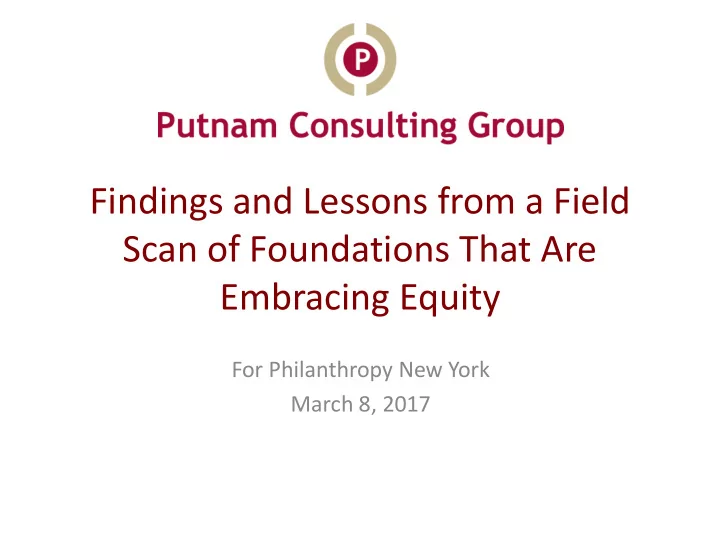

Findings and Lessons from a Field Scan of Foundations That Are Embracing Equity For Philanthropy New York March 8, 2017
Download Full Report “Findings and Lessons from a Field Scan of Foundations That Are Embracing Equity” Download: Text the word Equity to 313131 OR visit putnam-consulting.com/resources/articles
Funders Interviewed • Blue Cross Blue Shield of • Ford Foundation Minnesota • W.K. Kellogg Foundation • The California • Kresge Foundation Endowment • Living Cities • California Wellness • Mary Reynolds Babcock Foundation Foundation • Annie E. Casey • San Francisco Foundation Foundation • Schott Foundation • The Colorado Trust • Surdna Foundation • Consumer Health Foundation • Dentaquest Foundation
Delusional Altruism: Genuinely seeking to be altruistic and make a difference, but not paying attention to the barriers we create that impede impact.
Delusional Altruism: Genuinely seeking to be altruistic and make a difference, but not paying attention to the barriers we create that impede impact. Transformative Giving: In order to have a transformative impact on issues and communities, we need to transform ourselves and our operations.
1. No Silver Bullet
2. It Helps to Define “Equity”
Sample Definitions of Equity • “Fairness or justice in the way people are treated.” ( Miriam Webster ) • “Just and fair inclusion in a society in which everyone can participate, prosper, and reach their full potential. ” (PolicyLink) • “Racial equity dismantles and acknowledges the historical, systemic and societal context of privilege and oppression. A racially equitable society is one in which there are unobstructed pathways for all to participate and reach their full potential” ( The Denver Foundation )
Source: Matt Kinshella
3. Why Prioritize Equity? “If we expect to help all children succeed, we must do more than closing gaps and pointing to disparities. All of our work must strive to achieve race equity, a state in which all children have the same opportunity to reach the potential we know they have.” --Patrick McCarthy President and CEO, The Annie E. Casey Foundation
4. CEO & Board Leadership Critical • Can start anywhere • CEO must champion • Top down & bottom up
5. Funders Must Walk the Talk • Don’t jump to grantmaking • Can’t expect others to do what not willing to do yourself
6. What Does Operationalizing Equity Mean? • Governance • Finance • Leadership • Administration • Planning • Investments • Communications • Grantmaking • HR • Fundraising • Grants Management • Consultants • Evaluation • Vendors • Public Policy
Operationalizing equity in: Planning • Theory of change • Strategic plan • Framework • Workplans • Disaggregating data
Aggregate Data CHILDREN IN EXTREME POVERTY - MINNESOTA ~6%
Disaggregated Data
Operationalizing equity in: HR • Learning & Training • Hiring • Performance reviews • Compensation analysis • Vendors
Operationalizing equity in: Grantmaking • Race equity impact assessments • Equity-related – Questions – Assessments – Trainings – Mini grants • Supporting grassroots, leaders of color, advocacy, systems change
7. Valuable Role of Consultants
8. Common Challenges • Bringing staff, board along • Lack of CEO leadership • Culture change takes time • Maintaining broad equity lens • Investment tensions • Hard to visualize, explain equity • Missing data
9. How to Move Forward 1. Discuss these findings internally 2. Disaggregate your data 3. Secure leadership and board support 4. Make an internal commitment to change before requiring grantees to do so 5. Define what you mean by equity 6. Learn from grantees and other funders 7. Embrace the discomfort 8. Allow time
Learn More! Download the full report: Text the word Equity to 313131 OR visit putnam-consulting.com/resources/articles Questions? Contact Kris Putnam-Walkerly at kris@putnam-consulting.com or 800-598-2102
Recommend
More recommend